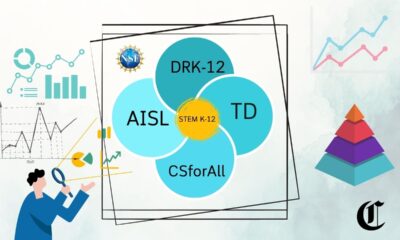Questions of the Day Program
Stephanie Okeyo discusses a preliminary report on the landscape of science engagement funding in Africa
CivicSciTV’s Questions of the Day Host Fanuel Muindi interviews Stephanie Okeyo, founder and director of Under the Microscope (UTM), a non-profit organization advancing science and innovation infrastructure in Africa through Education, Societal Engagement, and Research. A microbiologist by training, Okeyo discusses a preliminary report on science engagement funding landscape in Africa that UTM has been undertaking with partnership from the Falling Walls Engage and the West African Center for Cell Biology of Infectious Pathogens (WACCBIP). Okeyo emphasizes the importance of understanding local contexts and the impact of their programs on marginalized communities. Okeyo also highlights the need for sustainable funding and national support, and outlines future plans for expanding UTM’s reach, including developing more community-based engagement hubs and enhancing collaborations with local and international partners. A notable quote from Okeyo: “Public engagement is so important, and there is less evidence supporting the impact of this work. Our goal is to make the space more evidence-based, and supporting conversations and actions from the lived experiences and real data.”
Learn more about the project: https://www.underthemicroscope.net/view_research?id=3
More about Stephanie Okeyo Okeyo has held previous roles as Ambassador of Women in Science, East Africa and Representative to the United Nations office in Geneva at the Royal Academy of Science International Trust (RASIT). She was also a 2023 science communication fellow at the International Institute for Systems Analysis (IIASA). In 2019, Okeyo was recognized by Africa Science Week as one of Kenya’s Under 30: Breaking Barriers Women in STEM and was a nominee in the 2021 Zuri STEM category. She is passionate about science engagement for public and planetary good, advocating for participatory research culture, empowering young girls in STEM and championing gender equality in science and technology.
Fanuel Muindi is a former neuroscientist turned civic science ethnographer. He is a professor of the practice in the Department of Communication Studies within the College of Arts, Media, and Design at Northeastern University, where he leads the Civic Science Media Lab. Dr. Muindi received his Bachelor’s degree in Biology and PhD in Organismal Biology from Morehouse College and Stanford University, respectively. He completed his postdoctoral training at MIT.

-
Audio Studio1 month ago
“Reading it opened up a whole new world.” Kim Steele on building her company ‘Documentaries Don’t Work’
-
 Civic Science Observer1 week ago
Civic Science Observer1 week ago‘Science policy’ Google searches spiked in 2025. What does that mean?
-
Civic Science Observer1 month ago
Our developing civic science photojournalism experiment: Photos from 2025
-
Civic Science Observer1 month ago
Together again: Day 1 of the 2025 ASTC conference in black and white
Contact
Menu
Designed with WordPress























